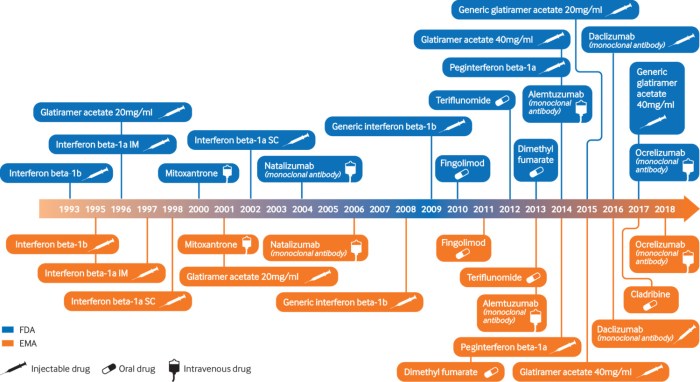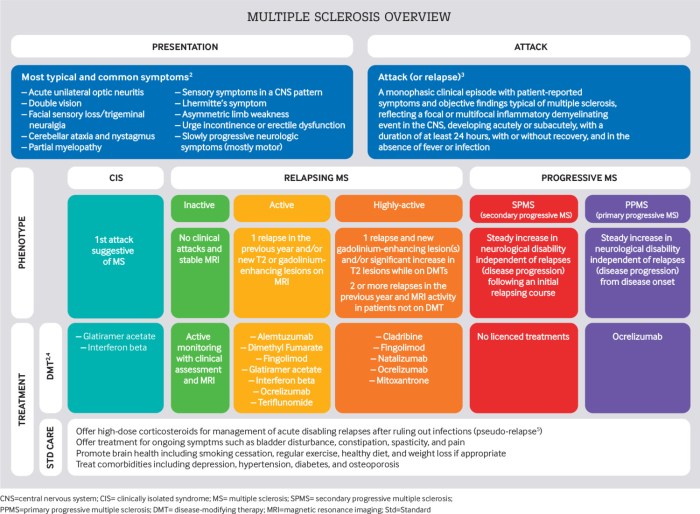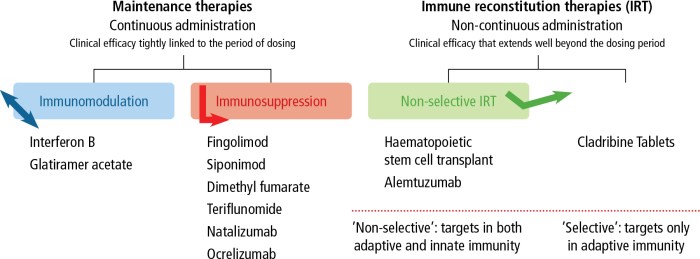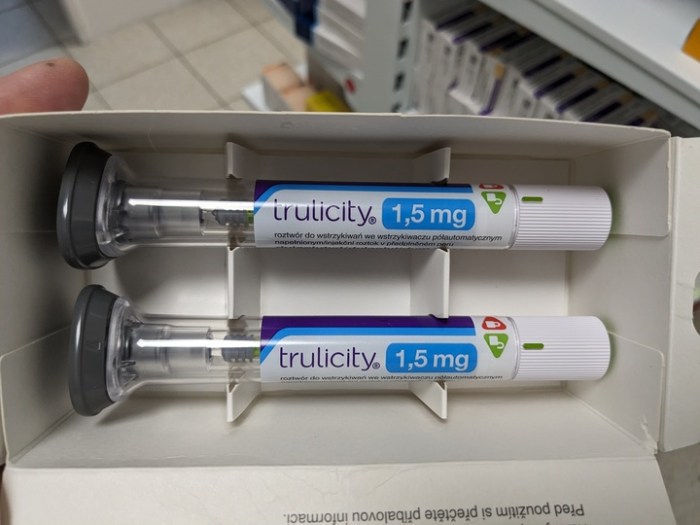Comparing MS Disease-Modifying Therapies (DMTs): A Comprehensive Analysis
Comparing MS Disease-Modifying Therapies (DMTs) sets the stage for this enthralling narrative, offering readers a glimpse into a story that is rich in detail and brimming with originality from the outset. This exploration delves into the world of DMTs for multiple sclerosis, shedding light on their significance and impact on patients' lives.
As we venture further into the realm of DMTs, we uncover the intricacies of these therapies, their mechanisms of action, and the pivotal role they play in managing the complexities of multiple sclerosis.
Overview of MS Disease-Modifying Therapies (DMTs)
MS Disease-Modifying Therapies (DMTs) are medications specifically designed to slow down the progression of multiple sclerosis (MS) and reduce the number and severity of relapses. These therapies work by targeting the immune system to prevent it from attacking the central nervous system.
Examples of Commonly Used DMTs
- Interferons: Drugs like Avonex, Rebif, and Betaseron are interferons that help regulate the immune system and reduce inflammation in MS patients.
- Glatiramer acetate: Sold under the brand name Copaxone, this drug helps prevent the immune system from attacking the myelin sheath in the central nervous system.
- Fingolimod: Also known as Gilenya, this oral medication helps trap immune cells in the lymph nodes, preventing them from reaching the central nervous system.
Importance of DMTs in Managing Multiple Sclerosis
Disease-Modifying Therapies play a crucial role in managing multiple sclerosis by slowing down the progression of the disease, reducing relapses, and delaying disability. These medications help improve the quality of life for MS patients by preventing further damage to the central nervous system and preserving neurological function.
Types of MS Disease-Modifying Therapies

Disease-Modifying Therapies (DMTs) for Multiple Sclerosis come in various forms, each with its own mechanisms of action and administration methods.
Injectable DMTs
Injectable DMTs are a common type of treatment for MS. They are administered through injections under the skin or into a muscle. These medications work by modulating the immune system to reduce inflammation and prevent attacks on the nervous system.
Examples of injectable DMTs include interferons like Avonex, Betaseron, and Copaxone.
Oral DMTs
Oral DMTs offer an alternative to injectable medications for managing MS. These medications are taken orally, making them more convenient for some patients. Oral DMTs work by targeting specific pathways in the immune system to reduce inflammation and disease activity.
Examples of oral DMTs include Fingolimod (Gilenya), Teriflunomide (Aubagio), and Dimethyl Fumarate (Tecfidera).
Mechanisms of Action
Different types of DMTs target various aspects of the immune system to prevent or reduce the severity of MS attacks. Some DMTs work by suppressing certain immune cells that are involved in the inflammatory process, while others target specific proteins or pathways to modulate immune responses.
Understanding the mechanisms of action of each DMT is crucial in selecting the most appropriate treatment for an individual with MS.
Efficacy and Side Effects
When it comes to managing Multiple Sclerosis (MS), Disease-Modifying Therapies (DMTs) play a crucial role in slowing down the progression of the disease and reducing relapses. However, each DMT comes with its own efficacy and side effects, making it essential for patients and healthcare providers to carefully consider the risk-benefit profiles of each option.
Efficacy of Different DMTs
- Interferon Beta: Interferon beta is one of the oldest DMTs available and has been shown to reduce the frequency and severity of relapses in MS patients.
- Glatiramer Acetate: Glatiramer acetate is another commonly used DMT that has been found to be effective in reducing relapses in relapsing-remitting MS.
- Fingolimod: Fingolimod is an oral medication that has shown superior efficacy compared to some injectable DMTs in reducing relapses and slowing disease progression.
Common Side Effects of DMTs
- Injection Site Reactions: Many DMTs are administered through injections, which can lead to redness, swelling, or pain at the injection site.
- Flu-Like Symptoms: Some DMTs can cause flu-like symptoms such as fever, chills, and muscle aches, especially after the initial doses.
- Liver Toxicity: Certain DMTs may affect liver function, leading to elevated liver enzymes and the need for regular monitoring.
Comparison of Risk-Benefit Profiles
- When evaluating the risk-benefit profiles of different DMTs, healthcare providers consider factors such as efficacy in reducing relapses, side effect profiles, and individual patient preferences.
- Some DMTs may offer better efficacy but come with a higher risk of serious side effects, while others may have milder side effects but lower effectiveness in managing MS.
- It is crucial for patients to have open and honest discussions with their healthcare providers to determine the most suitable DMT based on their individual needs and treatment goals.
Treatment Guidelines and Decision-Making

When it comes to choosing a Disease-Modifying Therapy (DMT) for multiple sclerosis (MS), healthcare providers and patients must consider a variety of factors to make an informed decision. Treatment guidelines play a crucial role in guiding healthcare providers in selecting the most appropriate DMT for each individual patient.
Additionally, shared decision-making between healthcare providers and patients is essential to ensure that the chosen DMT aligns with the patient's preferences and goals.
Factors Considered when Choosing a DMT
- Patient's disease severity and progression
- Potential side effects of the DMT
- Effectiveness of the DMT in managing MS symptoms
- Patient's lifestyle and preferences
- Cost and accessibility of the DMT
How Treatment Guidelines Influence DMT Selection
- Treatment guidelines provide evidence-based recommendations on the most effective DMTs for different types and stages of MS.
- Guidelines help healthcare providers navigate the complex landscape of available DMTs and streamline the decision-making process.
- Following treatment guidelines ensures that patients receive the most appropriate and up-to-date care for their MS.
Shared Decision-Making in Choosing DMTs
- Shared decision-making involves open communication between healthcare providers and patients to discuss the risks, benefits, and preferences related to DMT options.
- Patient input is valuable in the decision-making process to ensure that the chosen DMT aligns with the patient's lifestyle, goals, and treatment preferences.
- Healthcare providers play a crucial role in providing information and guidance, while patients are empowered to make informed decisions about their MS treatment.
Closure

In conclusion, the comparison of MS Disease-Modifying Therapies (DMTs) reveals a nuanced landscape where decisions regarding treatment hold immense weight. By understanding the efficacy, side effects, and treatment guidelines associated with DMTs, individuals can make informed choices that positively influence their journey with multiple sclerosis.
FAQ Explained
What are the long-term effects of DMTs on MS patients?
Long-term effects of DMTs can vary depending on the individual and the specific medication. Some common long-term effects may include changes in immune response, risk of infections, and potential impact on other organ systems. It's important for patients to discuss any concerns with their healthcare provider.
How do lifestyle factors influence the effectiveness of DMTs?
Lifestyle factors such as diet, exercise, stress management, and smoking can impact the effectiveness of DMTs in managing MS. Maintaining a healthy lifestyle can complement the benefits of DMTs and improve overall well-being for patients.
Are there any natural alternatives to DMTs for managing MS?
While there are natural remedies and lifestyle modifications that can support MS management, they should not replace prescribed DMTs. It's crucial to consult with a healthcare provider before making any changes to the treatment plan.



